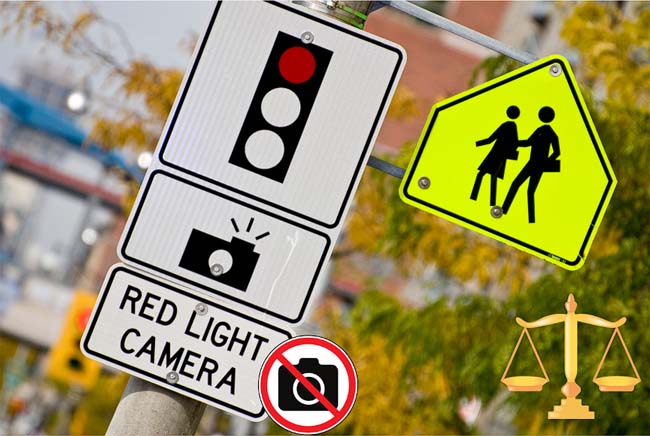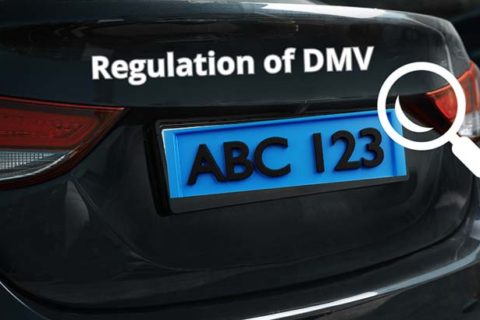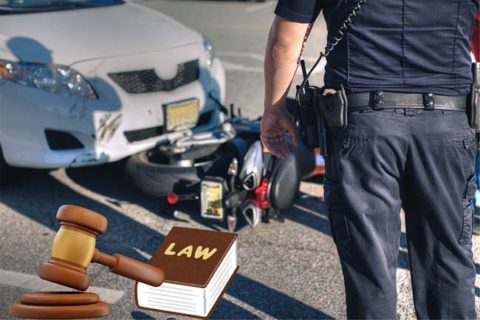Have you ever run a red light and a few weeks later received a fine? Well, this time, drivers across Texas can avoid those annoying fines. Apparently, the Texas legislature has banned red light cameras across the state. House Bill 1631 has been approved with bipartisan support in the House and Senate. And, Governor Greg Abbott has signed the bill into law.

Texas Red Light Cameras Ban
For vehicles that enter an intersection monitored by cameras, their vehicles will be photographed if they enter after the light turns red. They will be fined for the violation. After committing the offense, those who commit the offense will receive a ticket and a fine of $75.
Governor Greg Abbott signs a bill banning red light cameras in Texas. The law came into effect in September 2019. The law was created as a measure to protect drivers’ constitutional rights and reduce traffic accidents. With this law, taking pictures of vehicles entering an intersection when the traffic light is red is prohibited.
In some cities including Arlington, residents have removed the cameras from their neighborhoods. According to them, it has cost them a $75 fine. For your information, in Fort Worth, at 44 intersections, there are 58 red light cameras. To run the red-light cameras, the city of Fort Worth contracted Verra Mobility which is formerly known as American Traffic Solutions.
The amendment stipulated in the law allows cities to continue operating red light cameras until their contract with the vendor expires. For your information, the red-light camera contract in Fort Worth will expire in 2026. Many residents are already expecting the red-light camera contract to expire for several reasons, including the $75 fine. However, although the red-light camera contract in Fort Worth will expire in 2026, it seems that the cameras will disappear sooner. Sarah Fullenwider as a City lawyer told the Fort Worth Star-Telegram that the city’s contract with the vendor operating the red-light cameras will end as soon as Governor Greg Abbott signs the bill. And, a second amendment added to the bill, it prevents local and state officials from refusing to register a vehicle because the vehicle owner has an unpaid red light camera ticket.
Dallas County and several other counties in Texas flag accounts with unpaid red-light tickets and also prevent the registration of those vehicles from being renewed until the vehicle owner pays the fine. In Tarrant County, Tax Assessor-Collector Wendy Burgess said that people with accounts marked with red light tickets can go to the tax assessor-collector office. There are eight tax assessor-collector offices, and they can go to any of them. There, they can renew their vehicle registration in person, no matter how many red-light tickets they have yet to pay.
Some Communities Continued Programs
In 2019, state lawmakers approved and Governor Abbott signed a law prohibiting cities from using photo systems to ticket drivers who run red lights. After Governor Greg Abbott signed the legislation, the rule change went into effect immediately. However, in HB1631, there is a provision that allows Texas cities to continue to contract for ticketing systems until their contracts expire.
When Governor Greg Abbott enacted the new rules, almost all of the 57 communities across Texas that use red light cameras took advantage of the “Early out clauses” in their contracts to end the program. The “Early out clauses” allows the region to cancel the agreement when the state bans the ticketing machine system. So, with the “Early out clauses,” the region can cancel the contractual agreement.
However, “Early out clauses” does not apply everywhere. According to research, four locales across the state of Texas are continuing the red-light camera program due to a contract clause that prohibits early termination. The cities of Balcones Heights and Leon Valley in the San Antonio area eventually extended contracts to beat the legislative deadline. The programs extended by these cities last until 2034 and 2039 respectively. So, these cities are still enforcing the red-light ticket system. As for other places such as the city of Humble, the city must continue its program until June 2024. Meanwhile, the city of Amarillo, their program contract will end in August 2024.
New Bill
To cancel outstanding red light camera contracts, Representative Philip Cortez, D-San Antonio, has filed legislation for the regular session. His bill, HB177, allows cities across the state to cancel contracts that are still in effect. The changes take effect with a two-thirds vote of the legislature. Sections that do not meet the necessary votes to take effect immediately will delay the effective date until September 1. The new bill may be considered after the legislature convenes on January 10.
Justification for Canceling the Red-Light Ticket Program
In 2018, Governor Greg Abbott released a report outlining several factors for eliminating red light cameras. It explained that while side collisions were reduced, the likelihood of rear-end collisions due to sudden braking could increase. In addition to the possibility of rear-end collisions, the governor’s staff also highlighted the cost of operating the camera system. The report explains that it costs $100,000 to install a camera at one intersection.
In essence, the report explains that the cameras are very expensive. And, studies have also shown that the cameras can increase accidents if used. In addition, the cameras also raise constitutional issues. Therefore, Texas is not expected to grant permission for the installation of such devices.
Several Texas lawmakers are following up on the issue. They argue that the red-light ticket program does have a negative impact too. In fact, the officials from the Owner-Operator Independent Drivers Association also said that installing the cameras ignores other negative impacts. Without these devices, drivers are expected to prevent collisions by obeying traffic rules.
List of Texas Cities That Have Stopped Installing Red Light Cameras
After Texas Governor Greg Abbott signed a ban on red light cameras in the state, in less than a week, 57 of 61 cities have uninstalled red light cameras and ended their programs. The red-light camera ban comes two years after a KXAN investigation discovered that almost all Texas cities with red light cameras had already issued tickets illegally. Of course, this is very detrimental to drivers. According to research, since 2007, the cameras have generated more than $500 million in fines.
For your information, the city of Austin is one of the cities in Texas that does not have the necessary engineering studies. According to research, the city of Austin has ended its decade-old automated law enforcement system. Since the cameras were installed in 2009, the city of Austin has collected more than $7 million in fines. The city has directed vendors to stop installing red light cameras. As for any ticket photos taken after June 1, 2019, they will be null and void. This means that violations of the red-light camera rule are no longer valid.
As we know that Governor Greg Abbott signed a bill into law banning the installation of red-light cameras across the state. Although an effective date of September 1, 2019 is listed in the bill, since the bill passed both the House and Senate with a 2/3 majority approval, the law took effect when Governor Greg Abbott signed the bill. The ban on red light cameras also includes exceptions for some cities. These exceptions, called grandfather clauses, allow cities with contracts to finalize those contracts before removing their red-light cameras. We found out that most Texas cities that have contracts with private camera companies include an “adverse legislation” provision, which allows the city to terminate the camera contract if prohibition laws are passed.
Here is a list of Texas cities that have stopped installing red light cameras:
| No Longer Operating | Still Operating |
| Allen | Balcones Heights |
| Arlington | Humble |
| Austin | Leon Valley |
| Balch Springs | Amarillo |
| Bastrop | |
| Baytown | |
| Bedford | |
| Burleson | |
| Cedar Hill | |
| Cleveland | |
| College Station | |
| Conroe | |
| Coppell | |
| Corpus Christi | |
| Dallas | |
| Denton | |
| Diboll | |
| Duncanville | |
| Elgin | |
| El Paso | |
| Farmers Branch | |
| Fort Worth | |
| Frisco | |
| Garland | |
| Grand Prairie | |
| Haltom City | |
| Harlingen | |
| Houston | |
| Hurst | |
| Hutto | |
| Irving | |
| Jersey Village | |
| Killeen | |
| Lake Jackson | |
| League City | |
| Little Elm | |
| Longview | |
| Lufkin | |
| Magnolia | |
| Marshall | |
| McKinney | |
| Mesquite | |
| Montgomery County | |
| North Richland Hills | |
| Plano | |
| Port Lavaca | |
| Richardson | |
| Richland Hills | |
| Roanoke | |
| Round Rock | |
| Rowlett | |
| South Lake | |
| Sugar Land | |
| Tomball | |
| University Park | |
| Watauga | |
| Willis |
A KXAN investigation conducted in 2017 found that nearly 50 Texas cities including Austin that have these camera systems installed them and fined drivers without following the state law. As per the law, a city must first conduct an engineering study before issuing a red-light camera ticket. For example, the city of Abilene conducted an engineering study. The engineering study showed that installing cameras would not help reduce accidents at the intersection. Therefore, the city of Abilene never installed red light cameras at intersections.
In addition, people who disagree with the installation of red-light cameras also believe that the reason behind installing the cameras is to make money from the fines they demand. Law enforcers in those cities say that the cameras will provide increased safety and thus reduce collisions. The Austin Police Department also shared the same opinion. However, an investigation showed that the city never took the necessary action to penalize drivers who did not pay the $75 fine.
In the former red light camera law, it was made clear that a city could penalize drivers who did not pay the $75 fine by withholding registration renewal. That happened under an ordinance known as Scofflaw. The city of Austin has never had a contract with the Texas Department of Motor Vehicles (TxDMV) to enforce Scofflaw contract, since 2009. Therefore, the city of Austin has never had a way to penalize people for not paying the $75 fine.
A KXAN investigation found that only 23 cities in Texas have such authority. Other than the Scofflaw contract, the cities have no enforcement function for drivers who do not pay the fines for red light camera violations. In this case, the city government has not provided a definite time when the red-light camera vendor will remove the installation of cameras at nine intersections in the city. The cameras and equipment are owned by private camera companies. Therefore, the private camera company has the responsibility to remove or uninstall the cameras and equipment from nine intersections in the city. By removing these cameras, it is hoped that there will be no more cases of illegal red-light tickets.

A bookworm and researcher especially related to law and citizenship education. I spend time every day in front of the internet and the campus library.





